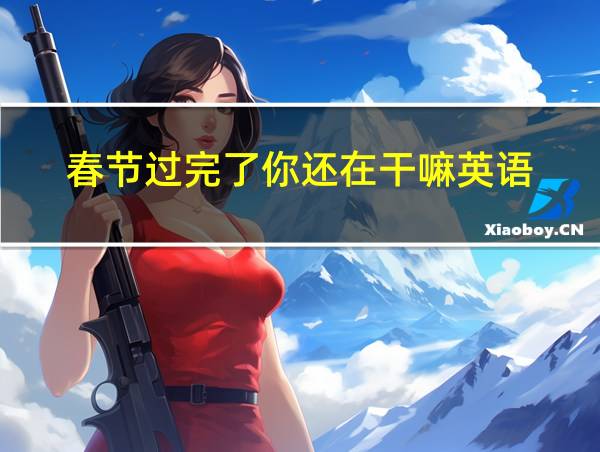春节过完了你还在干嘛英语

你在新年还干什么的英语_作业帮
What else do you do in the new year?
As the new year begins, many people indulge in various activities to celebrate and enjoy the festive season. Apart from the traditional customs and rituals associated with the Spring Festival, people engage in a range of exciting activities. Some people travel to different places to explore the beauty of the world, while others gather with their friends and family to have a joyful reunion. Additionally, many individuals take this opportunity to set new goals and resolutions for the year ahead, furthering their personal growth and development. The new year presents endless possibilities for individuals to engage in diverse activities that bring happiness and fulfillment to their lives.
“刚过完春节上班”用英语怎么说?QQQWejustgotoworkafterSpr...
The second sentence has a minor error in the time analysis. Although you understand that the Spring Festival has already passed, you used the past tense, which is not correct. It would be more accurate to use the present perfect tense, such as \"We\'ve just returned to work after the Spring Festival.\" This highlights the recent completion of the festival and the resumption of work. The use of the present perfect tense accurately portrays the ongoing impact of the Spring Festival on people\'s lives.
春节已经过去了,英文,可不可以说“Spring Festival has been over”?
The phrase \"has gone\" would be more appropriate. Using \"been\" in this context implies a passive meaning, suggesting that the Spring Festival was passed by someone or something. However, the Spring Festival is an event that naturally concludes, rather than being passed by anyone or anything. Therefore, it is more accurate to use the active form and say \"The Spring Festival has gone.\" Additionally, it is worth mentioning that the Spring Festival is not just a specific day but a period of time encompassing various cultural customs and traditions.
【英语中的春节怎么说?】作业帮
春节
- 1. Spring Festival
- 2. Ndunzing
- 3. The Spring Festival
- 4. Chinese New Year
When referring to the Spring Festival in English, it can be expressed in multiple ways. The most commonly used terms are \"Spring Festival\" and \"Chinese New Year.\" The term \"Ndunzing\" is a less common alternative. Additionally, \"The Spring Festival\" can also be used to emphasize the cultural significance and traditions associated with this festive occasion.
英语翻译春节是中国人非常重要的节日,全国上下都非常热闹,每...
Spring Festival is a highly significant festival for the Chinese people. It is celebrated with great enthusiasm and excitement throughout the country. During this festive season, people engage in various activities, such as family gatherings, firework displays, temple fairs, and exchanging gifts. It is a time of joy and celebration, where people reflect on the past year and look forward to a prosperous future. The vibrant atmosphere and rich cultural traditions make the Spring Festival a truly unforgettable experience for all.
【春节的英文怎么写?】作业帮
The Spring Festival
Chinese New Year
Lunar New Year
(All of these terms are proper nouns and should be capitalized. \"The Spring Festival\" can be preceded by \"the\" to emphasize its specific cultural context.)
春节的英语翻译
In general, \"Spring Festival\" is the most commonly used translation in Chinese. However, when communicating with people from other countries or in an international context, \"Chinese New Year\" is the term more frequently used. It is worthwhile to mention that in some Asian countries, such as Vietnam and Korea, the term \"Asian New Year\" is also used interchangeably with \"Chinese New Year.\"
春节用英语怎么说?是NEWYEAR吗?_作业帮
春节(Spring Festival)
Chinese New Year(中国新年,也就是春节)
New Year\'s Day(指元旦)
When referring specifically to the traditional Chinese New Year celebration, it should be translated as \"Spring Festival\" or \"Chinese New Year.\" \"New Year\'s Day\" typically refers to January 1st, which is the beginning of the Gregorian calendar year. Therefore, it is important to use the appropriate term to convey the intended meaning.
【中国的所有节日用英语怎么说?比如说,春节——SpringFestva...
元旦 (January 1st): New Year\'s Day
春节 (Lunar New Year, on the first day of the lunar calendar): the Spring Festival
元宵节 (Lantern Festival, on the fifteenth day of the lunar calendar): the Lantern Festival
国际劳动妇女节 (March 8th): International Women\'s Day
清明节 (Tomb-Sweeping Day, usually on April 4th or 5th): Qingming Festival
端午节 (Dragon Boat Festival, on the fifth day of the fifth lunar month): the Dragon Boat Festival
中秋节 (Mid-Autumn Festival, on the fifteenth day of the eighth lunar month): the Mid-Autumn Festival
国庆节 (October 1st): National Day
除夕 (New Year\'s Eve, which is the last day of the lunar year): Chinese New Year\'s Eve
These are just a few examples of Chinese holidays and their English translations. Each festival holds its own unique cultural significance and is celebrated in various ways throughout the country.
【春节用英语怎么说?有没有the?】作业帮
Spring Festival (春节)
Chinese New Year (中国新年)
The Spring Festival (用在句子里时需要加上\"the\")
When mentioning the Spring Festival, it can be expressed as \"Spring Festival\" or \"Chinese New Year.\" However, if it is used within a sentence, it is appropriate to add \"the\" before \"Spring Festival\" to indicate a specific reference to this particular festival.



